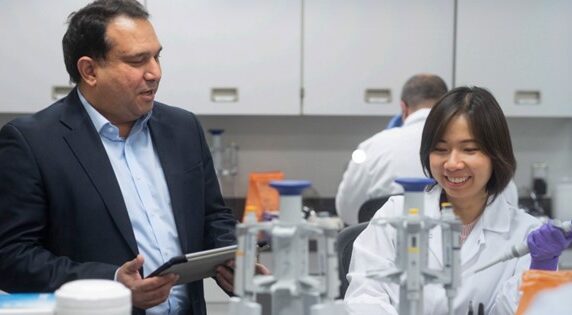Saskatchewan has a long-standing reputation as a global leader in agriculture and agricultural research. The province is also known for its strong sense of community and cooperative spirit. This openness is one of the things that attracted NRGene.
NRGene is a genomics company that uses cutting-edge AI technology to provide end-to-end solutions to help international agriculture, seed, and food companies optimize and accelerate their breeding programs.
Headquartered in Israel, the company expanded their operation to Canada in May 2020, when they opened an office and genotyping centre in Saskatoon.
“All the major seed companies and research centres are here,” says Dr. Masood Rizvi, general manager of NRGene Canada, “The idea was to set up a subsidiary within the Canadian prairie region, where most of the agriculture grows. Bringing our technology closer to the Canadian agricultural community allows us to work closely with our partners, who can now take advantage of our technology and work towards more productive and sustainable agriculture.”
Rizvi says the goal is to hire more people in different segments and boost the local economy. “We started with one employee, which was me, in 2020. As of January 2022, we have 11 full-time staff.”
When NRGene was thinking about moving to Saskatchewan, Rizvi says Ag-West Bio was instrumental in providing information to support their decision and to help NRGene make connections in Saskatoon’s agriculture research cluster.
“We see collaborations as the key for success, and Ag-West Bio provided that,” says Rizvi.
One of NRGene’s first major partnerships in Canada was with Protein Industries Canada to develop new pea and hemp varieties for use in plant-based food and ingredients. The project aims to increase the amount of protein and improve the starch content and texture of ingredients derived from new varieties.
Arriving in the middle of a global pandemic made it more challenging for NRGene to make connections in the agriculture research community, but they managed.
“We are customer focused, so when we started our Canadian operation, we immediately met our customers face-to-face,” Rizvi said. “But we are also a very agile company, so we adapted to the new reality and changed the way we communicate with our partners and started meeting them virtually.”
Now that the pandemic is waning, he says they’re taking every opportunity to get out and talk to their partners, ask what challenges they are facing and discuss how NRGene’s technology can help. The company is quickly learning about local needs, and uses that information to optimize their AI solutions and tailor it to the prairie ecosystem.
“Our Saskatoon branch is offering end-to-end solutions provided by our local genomics breeding team,” says Rizvi.
That ‘end-to-end solution’ is what sets NRGene apart from other genomics companies. “We’re not just a service provider that takes samples and provides data back to the customer. We work with our customers to really understand their challenges, we come up with the best solution to their problem and support them throughout the project,” he explains.
Using their vast proprietary database and AI-based technologies, NRGene is helping seed and food companies maximize their crop yield while saving time and money. “We strive to give our customers high quality data and help them achieve their breeding goals faster.”
“Our technology allows us to make predictions based on genomics (such as sequencing and genotyping). We can eliminate the trial-and-error factor from the breeding program and through computational predictions, indicate which plant has the desired trait,” he says. “This can significantly reduce costs, and ultimately, reduce the carbon footprint associated with taking a large number of plants to the field for phenotyping.”
Climate change and a growing population will mean a rising demand for food. Rizvi says the priority for the last 10 years has been to increase yields, but he also sees a need for more resilient crops.
“People are using a lot of different tools—like genomic selection, predictive selection, and phenotyping—to enhance productivity. But what we see for the future is the need to create ‘smart’ crops that can adapt to the changing environment.”
He sees an important role for AI technology to help farmers reduce their inputs and grow more adaptive crops. “Whether the variety takes less water or can survive with low fertilizer, these traits are all very important to reduce carbon footprints.”
He says Canada’s plan to achieve net-zero emissions by 2050 is mostly a challenge for farmers, because of water challenges and how much fertilizer is going into the field. “It’s all going to change.”
However, those challenges are not only for farmers. Rizvi says it starts with the seed companies, who are quickly implementing genetic technologies to develop crop varieties adapted to climate change stresses, like drought or frost.
“Living on the Prairies, we cannot avoid the frost,” he says. “But we can create crops that are more adaptive to the ever-changing climate.”
